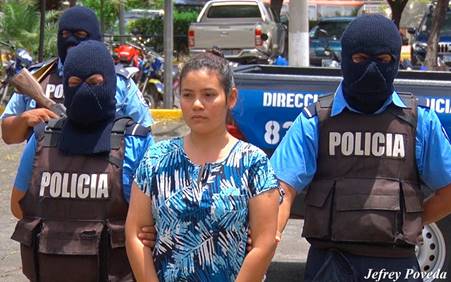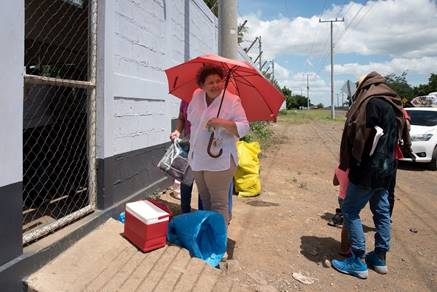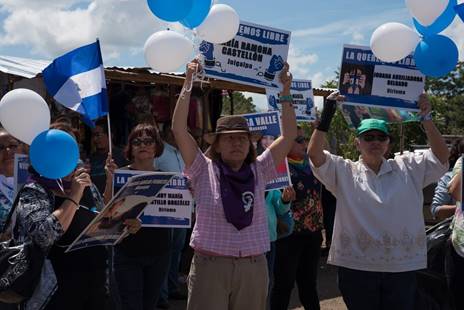17 de septiembre 2018

Children of Exile: The Births “Sowing Hope” in the Camp of Nicaraguan Farmers

PUBLICIDAD 1M
PUBLICIDAD 4D
PUBLICIDAD 5D
The water used for bathing produces fungi in their skin and they have no access to medicines, although one of them suffers terminal cancer.

Maria Adilia Peralta presentada por la Policia. Photo: el19digital.com
At the “La Esperanza” (Hope) prison in Tipitapa, 17 women are illegally detained. For them there is no sun light, nor phone calls from their relatives. They receive no medical attention and are considered by the prison wardens as “highly dangerous criminals.” The crime committed by these women was to protest against the regime of Daniel Ortega and Rosario Murillo. Their punishment is to be confined in a prison, without any care and in inhumane conditions.
“Some of the women have a very serious health conditions. Two of those are from the town of Diria. One has hypertension and heart problems. The other one has gall-bladder problems. My daughter told me that the latter was screaming from pain,” stated Mariela Cerrato Vasquez, mother of Maria Adilia Peralta Cerrato, to CONFIDENCIAL.
Cerrato recounted the hardships that these 17 women political prisoners go through and who are illegally detained in this prison located 15 kilometers from Managua. The young woman told her mother that there is a woman who has cancer and is in the terminal phase. She has no medication to treat her condition. If she eats, she gets swollen and the pain worsens.
“My daughter told me that they have not taken her to receive any specialized care, and that is inhumane,” she added.
The woman with terminal cancer is Brenda Munoz, who was arrested in July by the police and paramilitaries in Diria. Relatives of Munoz have not been able to get the medicines to relieve her pain. “The old lady (her mother) told me that at the health center and the hospital they tell her that since her daughter is a terrorist, they cannot give her anything,” said Cerrato Vazquez.
Before entering La Esperanza to speak to her daughter, Vazquez Cerrato had to wait three hours outside the prison. The guards told her that due to the serenade that a group of women gave the political prisoners on of Thursday, September 13th, they could not open the gates for “security reasons.”
In this activity participated Ana Quiroz, Director of the Information and Health Advisory Services Center (CISAS), who confirmed the serious health condition of Muñoz.
“They want to silence these women with their detention, they want the people of Nicaragua to keep quiet and to stop demanding freedom, equality and democracy. We will continue to demand that this corrupt judicial system be changed, because a system that imprisons a woman who is in a terminal phase of cancer, and does not release her, is a criminal system. I am referring to Brenda Munoz,” expressed Quiroz.

Mariela Cerrato Vazquez visits her daughter in jail. Carlos Herrera / Confidencial
Without medical attention
Maria Adilia Peralta Cerrato and Cristhian Fajardo Caballeros are married. Both leaders of the April 19th Movement in Masaya were captured in the month of July at the Costa Rican border. Both were indicted by the Office of the Public Prosecutors for terrorism, financing of terrorism, organized crime and obstruction of public services (transportation).
“First she was held at El Chipote, which is a small prison. She says that sometimes she heard screams, as if they were torturing someone. She was not tortured, but she was stripped naked and forced to do squats,” said Cerrato Vazquez, who stated not to know the condition of her son-in-law, because he is kept isolated at the La Modelo penitentiary.
Concerning Olesia Munoz, who sang at the Saint Ann’s Church in Niquinohomo, where she also taught piano, guitar and flute, Peralta Cerrato told her mother that she had a skin infection that caused high fevers.
“They do not have medical attention. They are neglected. When they have to go to court, they take them out at three in the morning, even though the hearing isn’t until late in the afternoon. Several are stripped naked and put to do squats. They have fungi in their skin. Some suffer from strong abdominal pains and other have hypertension problems,” said Vazquez Cerrato.
Peralta Cerrato was in poor health in recent days. She requested the prison guards to call her mother so she could bring her the medication. However, this never happened despite the severity of her condition.
“Today, when my daughter received her medicines, she believed that it was because I was notified, but I told her that it was not like that. She suffers from bronchospasm and if I brought her medication because I know that she needs them,” refers the mother of this political prisoner.
Some of the new prisoners have not received any parcels. Vazquez Cerrato urged the relatives of these women to bring them food and some products for their personal hygiene.
“The girls are with fungus and other skin infections. The water is probably contaminated and is the cause. Relatives have to take medication that can be applied to the skin. Maria Adilia also told me that Elsa Valle continues with problem on her foot. They have not taken X-rays and it is not known if it is a fracture, a sprain or a lesion. She walks with a lot of difficulty because she cannot place her heel down,” stated Vasquez Cerrato.

Dozens of women came to give support to the prisoners with a serenade. Carlos Herrera / Confidencial
Resistance continues
In spite of being locked-up, receiving mistreatment, without medical attention and in solitary confinement, the women political prisoners have maintained their unity and the hope to “have a new Nicaragua.” According to Vazquez Cerrato, Maria Adilia and her companions, do not regret having participated in the civic protests that demand the regime’s departure.
“She asked me to tell Nicaraguans to continue the struggle, that they will resist, that they will not surrender, and will endure whatever it takes for Nicaragua to be free. The struggle should not fade away,” stated Vazquez Cerrato.
Maria Adilia talked with her mother for three hours. During that time, besides telling her of all the privations they suffer in prison, she has also heard the “good news” about the situation of Nicaragua.
“She asked me about what is happening outside. She got very happy when I told her about the resolution of the OAS, and explained to her what it meant. I told her that they kicked-out the team from the UN. Also that the issue was addressed in the United Nation’s Security Council. That we are going to Geneva, that the human rights delegates in Nicaragua are going and that many governments have issued statements. I told her everything so that she could be informed and so she would tell the other prisoners. She was happy for the progress,” she said.
At “La Esperanza”, 17 women are inmates. According to the Nicaraguan Feminist Coordination (Articulación Feminista de Nicaragua), there are a total of 35 female political prisoners. Those who are not in this prison, are at the feared El Chipote interrogation jail.
“My daughter told me not to forget the male and female political prisoners. I told her that we have not forgotten them, that we go to the marches and that we always keep them in mind. I do not know from where she has gotten such courage and strength. I fought against Somoza and did not think that I would go through this again. So many people gave their lives for the revolution, to end up with this. We ended up worse than with Somoza. This is what hurts us the most, that we fought against Somoza,” declared Vazquez Cerrato.
Archivado como:
PUBLICIDAD 3M
Periodista. Investiga temas de medio ambiente, corrupción y derechos humanos. Premio a la Excelencia Periodística Pedro Joaquín Chamorro, Premio de Innovación Periodística Connectas, y finalista del premio IPYS en el 2018.
PUBLICIDAD 3D